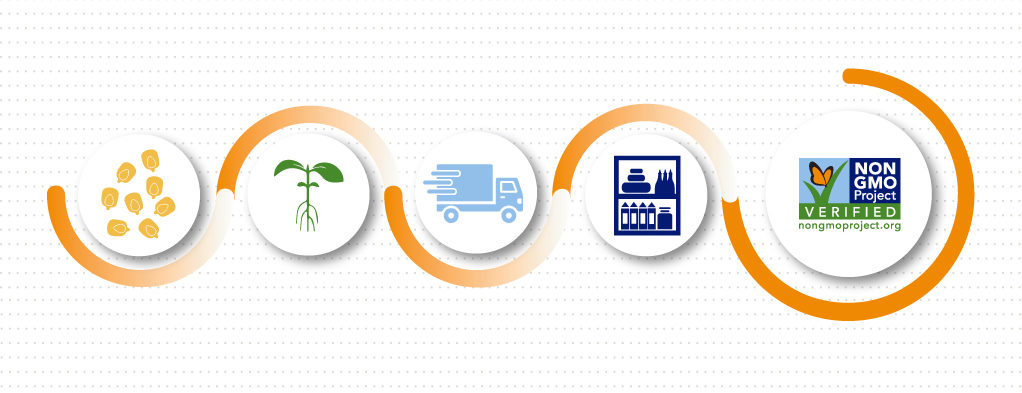It’s not just grocery shoppers who are looking for Non-GMO Project Verified products — the brands you know and trust look for the Butterfly when they source ingredients too! As shoppers demand more transparency from food brands, brands are in turn demanding more transparency and more documentation from their suppliers. For the supply chain participants who make our favorite ingredients, this means proof of Non-GMO Project Verification is more important than ever before.
Non-GMO Project Certificate of Verification
Just like consumers look for the Verified mark as proof a product is really non-GMO, food producers look for a Non-GMO Project Certificate of Verification (COV). Each Verified product receives a COV with an expiration date, a unique certificate number, and a scope of verification: all the information downstream clients need to confirm that the ingredients they seek are truly Non-GMO Project Verified.
Getting a product Verified is hard work, but the good news is that verification can follow an ingredient all the way through the supply chain. For example, one food company might choose to have their corn flour evaluated. When they sell that Verified corn flour to a company that makes Verified corn tortillas, the tortilla company does not need to spend time and money getting that flour re-tested. Instead, they simply follow best practices to prevent contamination and show the COV from that flour to their third-party Technical Administrator. This helps Verified brands pass savings on to consumers without compromising quality.
 Self-Made Claims Are Not Enough!
Self-Made Claims Are Not Enough!
You may have seen “self-made” non-GMO claims on products before. Without the backing of a third-party certifier like the Non-GMO Project, these claims are asking for trust with no proof. These self-made claims are not good enough for most people anymore. Trusted non-GMO certifications are now all but mandatory in the natural product industry, especially as brands prepare to comply with new laws and store policies. For example:
The National Bioengineered Food Disclosure (a new law in the United States) will require many food producers to demonstrate that their products do not contain GMOs. As thousands of brands prepare for compliance with this new law, they are all seeking non-GMO goods accompanied by proper documentation.
Non-GMO Project COVs are particularly invaluable to participants who wish to sell their product in Whole Foods Market, which will require third-party verification for products making a non-GMO claim by 2022. As more stores develop non-GMO purchasing and labeling policies, brands increasingly need to prove their Verified status to secure space on store shelves.
Look for the Butterfly
The Non-GMO Project doesn’t just test for GMOs in finished products, it demands testing and transparency all the way back through the supply chain. For brands, a COV is proof of that testing and transparency. For consumers, the Non-GMO Project Verified mark means the same thing: this product earned North America’s most meaningful label for GMO avoidance.
